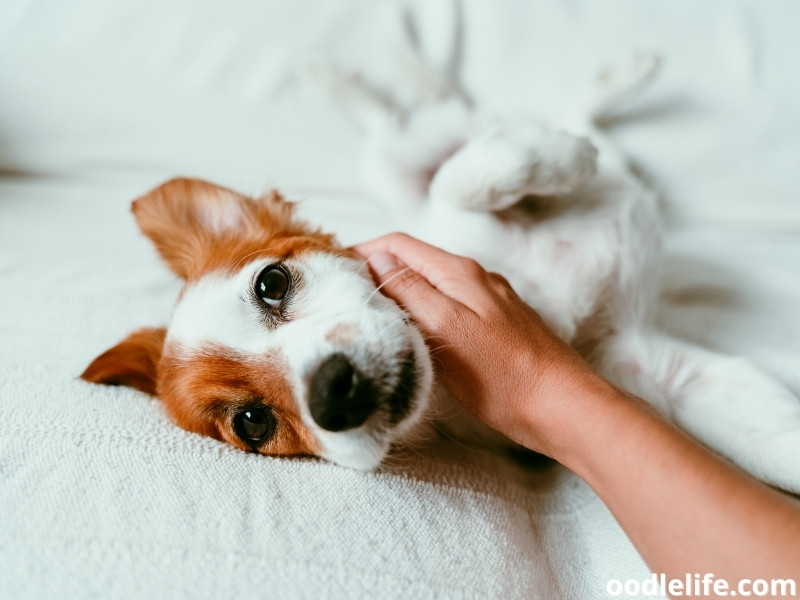What to do if your Dog is Grunting
The best response to grunting will depend on if additional symptoms are present as well as the animal’s overall behavior. Most of the time, simple grunting from your canine does not require any sort of treatment. It is a natural vocal response to many situations. However, when it becomes chronic, is accompanied by other symptoms such as difficulty breathing, flinching from touch, or other signs of discomfort or pain, it may require additional consideration.
Dogs that are snuffling and snorting along with the grunting may need to be evaluated to ensure that there are no impediments to their breathing. If the respiratory sounds are accompanied by shortness of breath, a vocal change, or coughing, there may be a serious underlying condition. Depending on the diagnosis, treatment may require antibiotic or anti-inflammatory medications, or in severe cases, surgical intervention. Dogs with short noses, also referred to as brachycephalic dogs, may suffer from a disorder known as Brachycephalic Obstructive Airway Syndrome (BOAS), which is manageable with veterinary assistance, although not curable.
If your dog is flinching from touch when the grunting occurs, you will want to watch for other signs that the dog may be in pain, such as obsessively licking a certain spot, dilated pupils, and increased heart rate, blood pressure, and respiration. Depending on the location and severity of the pain, your veterinarian may recommend over-the-counter anti-inflammatory medications or may request that you bring the dog in for a more thorough physical examination. If your dog is also stretching its legs out far in front of it and arching the back, he may be trying to relieve pain in the abdomen or back. If this behavior, known as the “position of relief” or the “dog praying position,” is exhibited by your dog, you should contact a veterinary professional immediately as this may indicate a serious condition such as pancreatitis, intussusception or bloat.
Although grunting itself is not generally considered a medical disorder that requires prevention, many of the disorders that it can characterize may be prevented.
While most causes of laryngeal paralysis cannot be prevented, the risk of trauma can be lessened by monitoring your dog close and ensuring they are not put in dangerous situations e.g. with unknown dogs. As uncontrolled hypothyroidism can also be a cause, ensure any hormonal disorders are well managed with medication.
Dogs that are prone to bloat should be prevented from gulping their food. This can be accomplished by feeding the animal in multiple smaller portions rather than just one or two large meals and choosing food bowls designed to slow the dog down while it is eating. Choosing food with fewer carbohydrates and delaying exercise after eating may also reduce the chances of developing this dangerous condition. For those at highest risk, a preventative surgery called a gastropexy may be considered.
The cost for treatment in regards to symptomatic grunting depends greatly on the underlying cause of the vocalizations. The average costs for disorders that are characterized by grunting can vary greatly. While a case of minot trauma may only cost a few dollars for anti-inflammatories, laryngeal paralysis generally runs around $2000, while bloat has an average treatment cost of around $5000 to treat.
Worried about the cost of treating your pets symptoms?
Pet Insurance covers the cost of many common pet health conditions. Prepare for the unexpected by getting a quote from top pet insurance providers.
Barking is a dog’s main way to communicate, and it can mean a lot of things.
Barking is a dogs primary means of communication, so it should come as no surprise that barks mean different things, according to Whole Dog Journal. Your dog may bark to alert of danger, to demand attention or treats, to voice frustration, to express anxiety or fear, or to greet you when you get home. Sometimes, dogs bark while playing; other times, theyre just plain bored.
When does your dog usually grunt?
Keep an eye out for whether the grunting is frequent and if there is a particular time or a particular situation when your dog does it.
For example, if your dog grunts when you pet them, check whether you are putting pressure on some injury that is causing the grunting. Or if your dog starts grunting at your usual play time, it might want to remind you to take them out.
If you identify any pattern in your dog’s grunting, it can help you understand the reason for it.
